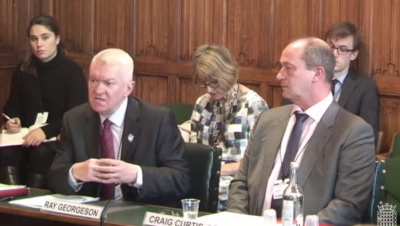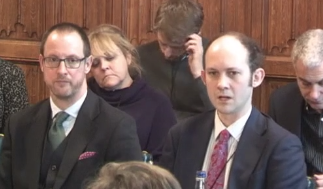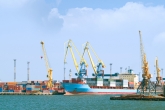MPs told China ban ‘the biggest problem the recycling industry has ever faced’
Representatives of the UK resources and waste sector called Chinese waste import restrictions ‘the biggest problem the UK recycling industry has ever faced’ today (30 January), repeating calls for domestic secondary market development and government leadership during a hearing with Parliament’s Environmental Audit Committee (EAC) today (30 January).
The representatives of some of the UK waste sector’s biggest trade associations – Ray Georgeson (Resource Association), Craig Curtis (Recycling Association), Pat Jennings (CIWM), Lee Marshall (Local Authority Recycling Advisory Committee (LARAC)) and Jacob Hayler (ESA) – responded to questioning on the impacts of the Chinese Government’s decision to crack down on imports of foreign waste for the UK recycling sector.
Complete bans on 24 types of solid waste, including unsorted mixed papers and post-consumer plastics, began in January, while from 1 March any other materials exceeding a contamination limit of 0.5 per cent will also be blocked. Given the strict limits on contamination, these extra restrictions effectively constitute a ban, a development that will hugely affect the UK recycling industry, which currently sends about 494,000 tonnes of plastics and 1.4 million tonnes of recovered paper to China every year.
Immediate impacts
The bans were labeled the “biggest problem the UK recycling industry has ever faced” by Recycling Association board member Craig Curtis, a view unanimous across all those called to give evidence.
In terms of the immediate impacts of the ban, Jacob Hayler, Chief Executive of the ESA, said that a huge amount of import licenses had not been handed out by the Chinese Government to Chinese importers, with Curtis adding that only 10 per cent of licenses for 2018 released so far and that from 2019 import licenses in China would be issued on a quarterly rather than an annual basis, which would cause further uncertainty in the UK recycling industry.

Despite the almost prohibitive restrictions of 0.5 per cent contamination limits for all waste imports, Curtis stated that the Recycling Association’s members were able to meet that contamination rate, but only because export volumes had declined, with Curtis estimating a 40 per cent reduction in the tonnage of materials sent to China.
In the short-term, Hayler admitted there was little the government could do as “the Chinese are determined to go down this route [material restrictions], and the leverage we have is limited”, although Curtis did call on the government to increase representations to the Chinese Government in order to clarify certain aspects of the restrictions.
Georgeson, Chief Executive of the Resource Association, and Jennings, Head of Policy at CIWM, did call on the government to increase funding for the Environment Agency as the issue of stockpiling unmoved waste and the environmental and safety hazards that that posed, such as fire risks, was brought up. Nobody, however, was able to give more than anecdotal evidence at this stage.
Georgeson even suggested that the UK might consider the dry storage of plastic that can’t be exported in landfill sites until such a time as it can be recycled in the UK.
Leadership
What was clear was that the sector is still desperate for leadership and policy steer from government, especially in light of unprecedented public interest in waste following David Attenborough’s BBC series Blue Planet II, something Jennings called a “watershed moment” with the public, that could lead to a “crisis of confidence” in government and recycling services if visible action is not taken.

Defra has gained a new sense of vigour since the appointment of Michael Gove as Environment Secretary last June, with action on plastic waste especially high on the agenda. While the panel were encouraged by Gove’s performance in general, his engagement on the China issue was deemed to be somewhat lacking and not having changed much since he admitted to the EAC to not having given it “sufficient thought” back in November.
This lack of action is in contrast to the devolved administrations of Wales and Scotland, according to Jennings, with Wales surveying local authorities to find out the impact of the China restrictions on them, although the CIWM Head of Policy did admit that there were issues of scale to consider when comparing the actions of England and the devolved administrations.
Secondary markets
In terms of longer term government action, the panel were in agreement that more needs to be done to stimulate domestic secondary markets in the UK for the recyclable material collected in the UK to make up for the shortfall in capacity caused by the China, given that alternative markets in South East Asia either do not have the capacity to replace that lost from China or are keen not to become “dumping grounds” like China, as Jennings put it.
Georgeson stated that if exporters are able to meet China’s 0.5 per cent limit then export should continue to be part of a varied mix of waste solutions, but warned that from an environmental and ethical perspective, the ban should raise more fundamental questions about the things we buy, where they come from and how they are made, a position borne out of a desire to move UK recycling beyond simply sending waste to China just because, as Curtis put it, “it’s always been very cheap” due to labour costs and environmental standards.
Hayler offered some suggestions on how secondary markets could be stimulated at home, through minimum requirements for recycled content in packaging and other materials, for example, but also suggested that some fibre and paper wastes should be considered for energy-from-waste.
Georgeson reluctantly said that in the short term there may be no other option than to send this waste for incineration, but that this could lead to “public disillusionment” towards recycling.
Plastics
As has been well noted by now, interest in the plastic waste stream is currently sky high, and the panel were keen to point out the particular difficulties in recycling plastics. Given the variety of different polymers used in packaging and other products, it makes separation of materials ready for reprocessing more complicated and more expensive.
All members of the panel called for a rationalisation of polymers on the UK market in order to make facilitate their recycling and reduce costs for local authorities and materials recovery facility (MRF) operators.
EAC member Geraint Davis MP asked whether a ban on problem polymers and selective taxation could help to tackle the issue, with Georgeson saying that regulation and a coherent policy framework must be present in a well-functioning market economy “to curb the worst excesses of the free market”, but that the “heavy hand of the state” can have negative consequences, and so any regulatory or fiscal measures must be used with caution.
This rationalisation shouldn’t just be limited to plastics, however, with Hayler pointing to issues in other waste streams causing problems with contamination, for example. The problem, he said, “is about what we collect, not how it’s collected”, refuting suggestions that the quality of materials is lowered when using a co-mingled collection system as opposed to a source-separated one, as was suggested by John McNally MP. Hayler called for a focus on material streams that have the strongest end markets.
Curtis concurred with this position, lamenting the fact that householders were putting the wrong items in the wrong recycling streams, suggesting that they should follow the mantra “if in doubt, throw it out” if unsure over where to put a certain item, although Lee Marshall, Chief Executive of LARAC, stated that a more intelligent conversation was needed with “the lady and gentleman on the Clapham omnibus” about recycling through improved communications from local authorities, reversing the trend of declining communications budgets.
PRN reform
The topic of packaging recovery notes (PRNs) was also discussed, with all members of the panel calling for the system’s reform, with Marshall calling the system “not fit for purpose” regarding its main aim of generating funds for collection systems.
Kerry McCarthy MP brought up the issue of recycling rates with regard to China and asked whether waste exports counted towards recycling rates, to which Georgeson replied in the affirmative, stating that PRNs take no account of presumed contamination when calculating the value of recycled material. Packaging export recovery notes (PERNs) also do not account for contamination and the panel agreed that this needed to change.
Hayler, however, made the case that a common reporting methodology and move away from weight-based recycling measurements were needed for real progress on this issue, with Jennings calling weight-based measurements a “blunt instrument” that would need review in the government’s Resources and Waste Strategy.
DRS
The panel was finally asked by EAC Chair Mary Creagh about the prospect of bringing in a deposit return scheme (DRS) for plastic bottles, as recommended by the EAC, and whether this was now urgent in light of the Chinese restrictions.
Hayler stated that the question of a DRS was separate from that of the impact of the Chinese restrictions, but did add that a DRS may have a role to play in the wider context of plastics recycling and littering if it is targeted at on-the-go plastic waste and is considered as part of a complementary suite of measures in the Resources and Waste Strategy.
Jennings echoed the call for it to be part of a package of systemic changes, asserting that DRSs do work as long as they are part of larger systemic change rather than simply being bolted onto an existing one.
Marshall, meanwhile, questioned the need for a DRS at all, given “99 per cent of households currently receive plastic bottle collection services”, and raised concerns regarding local authority income from materials if plastic bottles were diverted away from the kerbside collection system.








